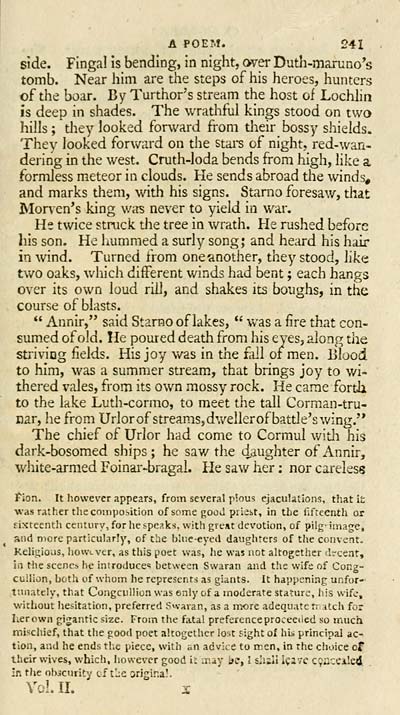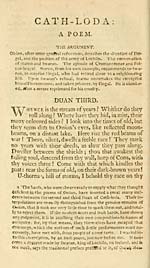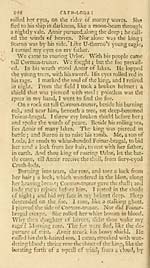Download files
Complete book:
Individual page:
Thumbnail gallery: Grid view | List view

A POEM. 241
Side. Fingal is bending, in night, ovei* Duth-maruno's
tomb. Near him are the steps of his heroes, hunters
of the boar. By Turthor's stream the host of Lochhn
is deep in shades. The wrathful kings stood on two
hills ; they looked forward from their bossy shields.
They looked forward on the stains of night, red-wan-
dering in the west. Cruth-loda bends from high, like a
formless meteor in clouds. He sends abroad the winds,
and marks them, with his signs. Starno foresaw, that
Mon en's king v/irs never to yield in war.
He twice struck the tree in wrath. He rushed before
Ills son. He liummed a surly song; and heard his hair
in wind. Turned from one another, they stood, like
two oaks, which different winds had bent ; each hangs
over its own loud rill, and shakes its boughs, in the
course of blasts.
" Annir," said Starno of lakes, " was a fire that con-
sumed of old. He poured death from his eyes, along the
striving fields. His joy was in the fiill of men. Blood
to him, was a summer stream, that brings joy to wi-
thered vales, from its own mossy rock. He came fortJi
to the lake Ludi-cormo, to meet the tall Corman-tru-
nar, he from Urlorof streams,dwellerof battle'swing.'*
The chief of Urlor had come to Cormul with his
dark-bosomed ships; he saw the daughter of Annir,
wliite-armed Foinar-bragal. He saw her : nor careless
fion. It however appears, from several p5ous ejaculations, that it
was rather the compoiition of some gooil priest, in the fifteenth or
sixteenth century, for he speaks, with great devotion, of pilg- image,
and more particularly, of the bhie-eyed daughters of the convent.
Religious, however, as this poet was, he was not altogether drcent,
in the sceno he introduces between Swaran and t!ie wife of Cong-
cullion, both of wtiom he represents as giants. It happening unfor-
tunately, that Congcullion was only of a moderate stature, his wifo,
without hesitation, preferred Svvaran, as a more adequate :r itch for
lierown gigantic size. From the fatal preference proceeded so much
mischief, that the pood poet altogether lost fight of his principal ac-
tion, and he ends the piece, with an advice to men, in rhe choice of
their wives, which, however good i: ir.ay iie, 2 sliili i?3 vc c?;::eiled
in the obscurity cf tl;e origir.a!.
Vol. H. X
Side. Fingal is bending, in night, ovei* Duth-maruno's
tomb. Near him are the steps of his heroes, hunters
of the boar. By Turthor's stream the host of Lochhn
is deep in shades. The wrathful kings stood on two
hills ; they looked forward from their bossy shields.
They looked forward on the stains of night, red-wan-
dering in the west. Cruth-loda bends from high, like a
formless meteor in clouds. He sends abroad the winds,
and marks them, with his signs. Starno foresaw, that
Mon en's king v/irs never to yield in war.
He twice struck the tree in wrath. He rushed before
Ills son. He liummed a surly song; and heard his hair
in wind. Turned from one another, they stood, like
two oaks, which different winds had bent ; each hangs
over its own loud rill, and shakes its boughs, in the
course of blasts.
" Annir," said Starno of lakes, " was a fire that con-
sumed of old. He poured death from his eyes, along the
striving fields. His joy was in the fiill of men. Blood
to him, was a summer stream, that brings joy to wi-
thered vales, from its own mossy rock. He came fortJi
to the lake Ludi-cormo, to meet the tall Corman-tru-
nar, he from Urlorof streams,dwellerof battle'swing.'*
The chief of Urlor had come to Cormul with his
dark-bosomed ships; he saw the daughter of Annir,
wliite-armed Foinar-bragal. He saw her : nor careless
fion. It however appears, from several p5ous ejaculations, that it
was rather the compoiition of some gooil priest, in the fifteenth or
sixteenth century, for he speaks, with great devotion, of pilg- image,
and more particularly, of the bhie-eyed daughters of the convent.
Religious, however, as this poet was, he was not altogether drcent,
in the sceno he introduces between Swaran and t!ie wife of Cong-
cullion, both of wtiom he represents as giants. It happening unfor-
tunately, that Congcullion was only of a moderate stature, his wifo,
without hesitation, preferred Svvaran, as a more adequate :r itch for
lierown gigantic size. From the fatal preference proceeded so much
mischief, that the pood poet altogether lost fight of his principal ac-
tion, and he ends the piece, with an advice to men, in rhe choice of
their wives, which, however good i: ir.ay iie, 2 sliili i?3 vc c?;::eiled
in the obscurity cf tl;e origir.a!.
Vol. H. X
Set display mode to: Large image | Transcription
Images and transcriptions on this page, including medium image downloads, may be used under the Creative Commons Attribution 4.0 International Licence unless otherwise stated. ![]()
| Early Gaelic Book Collections > Ossian Collection > Poems of Ossian, the son of Fingal > Volume 2 > (251) |
|---|
| Permanent URL | https://digital.nls.uk/77915666 |
|---|
| Shelfmark | Oss.54 |
|---|---|
| Attribution and copyright: |
|
| Description | Selected books from the Ossian Collection of 327 volumes, originally assembled by J. Norman Methven of Perth. Different editions and translations of James MacPherson's epic poem 'Ossian', some with a map of the 'Kingdom of Connor'. Also secondary material relating to Ossianic poetry and the Ossian controversy. |
|---|
| Description | Selected items from five 'Special and Named Printed Collections'. Includes books in Gaelic and other Celtic languages, works about the Gaels, their languages, literature, culture and history. |
|---|

